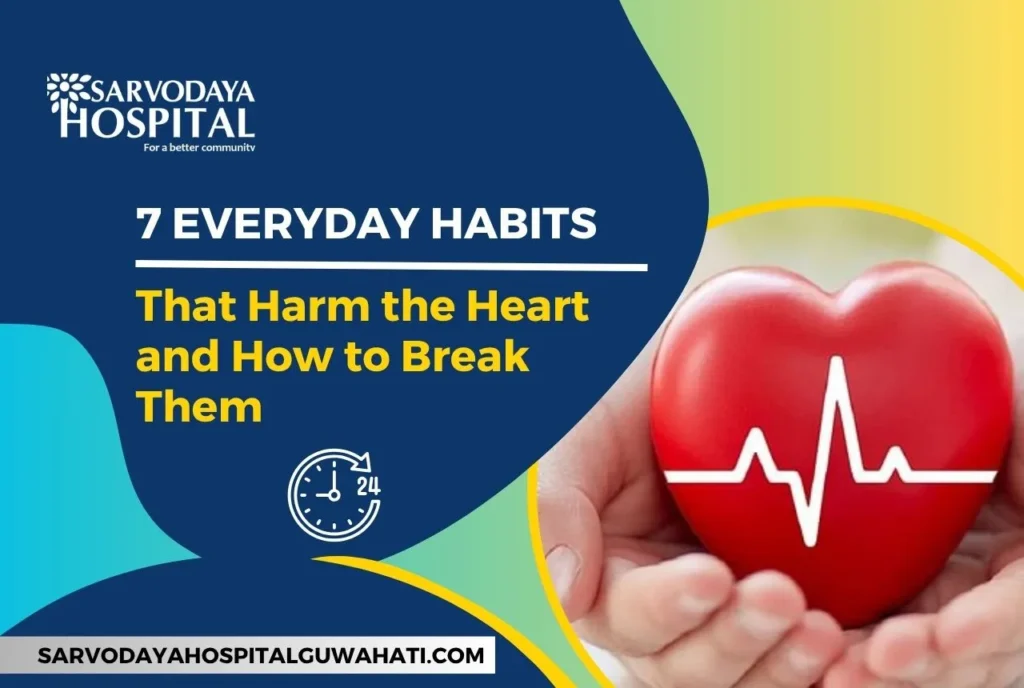Heart disease continues to be the leading cause of death worldwide, claiming millions of lives each year. According to the World Health Organization, nearly 18 million people die annually due to cardiovascular conditions. What makes this statistic even more alarming is that many of these heart-related issues don’t arise overnight—they build silently over time through everyday choices we often overlook.
From poor dietary habits to chronic stress and inactivity, habits that harm the heart may already be part of our daily routine without us realizing it.
The good news? Many of these risks are preventable. Small, consistent changes in lifestyle can drastically reduce the chances of developing heart conditions. In this article, we’ll explore seven common yet dangerous habits that damage your heart health—and offer practical ways to break free from them before it’s too late.
Understanding Habits That Harm the Heart Health
Our heart is remarkably resilient, but it’s not immune to the long-term effects of unhealthy behaviors. Habits that harm the heart—such as poor diet, lack of exercise, and unmanaged stress—can slowly compromise cardiovascular function, leading to hypertension, clogged arteries, and even heart attacks or strokes.
Heart disease typically develops over time, often starting with minor symptoms or none at all. The lifestyle we lead—what we eat, how we sleep, how active we are, and how we handle emotions—plays a key role in determining our heart’s health.
Alarming trends now show that younger adults are increasingly affected by heart-related conditions, mainly due to sedentary jobs, processed food consumption, and elevated stress levels. Early prevention is not only possible but essential. By recognizing and addressing risky habits early, we can protect our hearts well into the future.
Let’s now explore the seven dangerous habits that could be silently harming your heart.
Seven Dangerous Habits Damaging Your Heart
1. Leading a Sedentary Lifestyle
A lack of physical activity is one of the most common yet overlooked habits that harm the heart. Prolonged sitting reduces blood circulation, slows metabolism, and contributes to the buildup of fat in arteries. Inactivity is directly linked to higher blood pressure, poor cholesterol profiles, and increased risk of blood clots.
Post-pandemic work-from-home trends have exacerbated sedentary behaviors, making it even more critical to consciously include movement throughout the day. Even short walks, stretching breaks, or standing desks can make a big difference.
According to the latest 2025 guidelines, adults should aim for at least 150 minutes of moderate exercise per week, such as brisk walking, swimming, or cycling.
2. Consuming Excessive Sodium
High sodium intake, often hidden in restaurant meals and processed foods, causes your body to retain water, putting added pressure on blood vessels and raising blood pressure—a leading contributor to heart disease.
The recommended sodium intake is less than 2,300 mg per day, yet most people exceed this through snacks, sauces, and packaged meals. Foods like canned soups, instant noodles, and frozen dinners often contain surprisingly high sodium levels.
To protect your heart, opt for fresh ingredients and use herbs, spices, lemon juice, or garlic to enhance flavor naturally.
3. Skipping Breakfast Regularly
Skipping breakfast may seem harmless, but it disrupts metabolism and blood sugar regulation. Studies have found that those who skip breakfast frequently have higher cholesterol levels and an increased risk of heart disease.
Additionally, skipping the morning meal can lead to overeating or poor food choices later in the day, placing additional strain on cardiovascular health.
Heart-healthy breakfast options include oats with fruits, whole-grain toast with avocado, or a protein smoothie. Aim to eat within an hour of waking up to stabilize blood sugar and energy levels.
4. Poor Sleep Habits
Sleep is not just about rest—it’s a vital component of heart health. Both insufficient sleep (under 6 hours) and excessive sleep (over 9 hours) have been linked to higher heart disease risk due to effects on blood pressure, inflammation, and hormonal imbalance.
Irregular sleep patterns also disrupt circadian rhythms, increasing the likelihood of arrhythmias and metabolic disorders. Recent research emphasizes the importance of maintaining 7–8 hours of quality sleep per night for optimal heart function.
To improve sleep, maintain a regular bedtime, limit screen use before bed, and create a calming nighttime routine.
5. Mismanaging Stress and Mental Health
Chronic stress is one of the most underappreciated habits that harm the heart. Long-term exposure to stress increases levels of cortisol, a hormone that raises blood pressure, causes inflammation, and contributes to plaque buildup in arteries.
Mental health conditions like anxiety and depression are also linked to higher cardiovascular risk. Left unchecked, emotional stress can lead to unhealthy coping mechanisms such as smoking or overeating.
Healthy ways to manage stress include yoga, deep breathing, therapy, journaling, or simply spending time with loved ones. Strong social support networks significantly boost emotional and heart health.
6. Unhealthy Dietary Choices
Diets high in trans fats, added sugars, and processed foods significantly raise the risk of heart disease. These foods increase LDL (bad cholesterol), lower HDL (good cholesterol), and promote arterial plaque formation.
Common culprits include fried foods, sugary drinks, baked goods with hydrogenated oils, and highly processed snacks. In contrast, a heart-healthy diet focuses on vegetables, whole grains, lean proteins, and healthy fats like nuts and olive oil.
As per 2025 dietary recommendations, reducing red meat and refined sugar while increasing fiber-rich foods can drastically improve heart health outcomes.
7. Neglecting Preventive Healthcare
Skipping routine medical check-ups is one of the riskiest habits that harm the heart. Preventive care can detect early signs of heart disease—like high cholesterol or hypertension—before symptoms appear.
Key health markers to monitor include blood pressure, lipid profile, blood sugar, and BMI. Dental health is also linked to cardiovascular health, as gum disease has been associated with increased heart disease risk.
If you’re in Guwahati, Sarvodaya Hospital offers comprehensive cardiac care and screening services that can help you stay ahead of heart-related issues.
Prevention and Management Strategies
Protecting your heart doesn’t require drastic measures—it’s about consistency. Incorporate regular physical activity, adopt a balanced diet, manage stress, and get quality sleep. Preventive checkups are equally crucial.
At Sarvodaya Hospital in Guwahati, patients benefit from expert cardiac care, early screening programs, and lifestyle guidance. Numerous educational resources are also available to help you take proactive steps.
The goal is long-term heart health—and it starts with the choices you make today.
Final Thoughts on Habits That Harm the Heart
These seven habits that harm the heart are often ingrained in daily routines, but they can be reversed with conscious effort.
By making small, mindful changes and seeking regular medical guidance, you can protect your heart for years to come. Take the first step today—because your heart’s future is in your hands.


